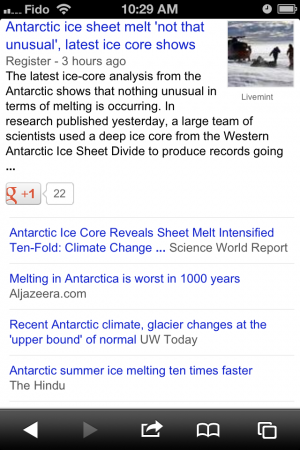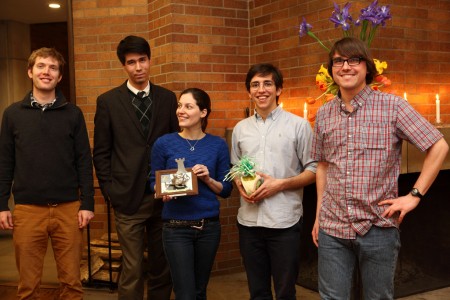Month: April 2013
Ups and downs
During the last few weeks, I feel like I have been experiencing more emotional volatility than usual (and I think I experience more than most people, even at normal times). Mostly, it has taken the form of abrupt downward spikes in mood that last for anywhere from a few hours to a couple of days.
Probably, it is the result of combining stress over papers, exams, and grading with my campaign to phase-out caffeine, alongside stress related to Toronto350.org, summer work and housing, and commercial photographic work.
Pink, yellow, and green
Research bees
Different journalistic interpretations of the same scientific study
Here’s the actual abstract from “Acceleration of snow melt in an Antarctic Peninsula ice core during the twentieth century“, published in Nature Geoscience:
“Over the past 50 years, warming of the Antarctic Peninsula has been accompanied by accelerating glacier mass loss and the retreat and collapse of ice shelves. A key driver of ice loss is summer melting; however, it is not usually possible to specifically reconstruct the summer conditions that are critical for determining ice melt in Antarctic. Here we reconstruct changes in ice-melt intensity and mean temperature on the northern Antarctic Peninsula since AD 1000 based on the identification of visible melt layers in the James Ross Island ice core and local mean annual temperature estimates from the deuterium content of the ice. During the past millennium, the coolest conditions and lowest melt occurred from about AD 1410 to 1460, when mean temperature was 1.6 °C lower than that of 1981–2000. Since the late 1400s, there has been a nearly tenfold increase in melt intensity from 0.5 to 4.9%. The warming has occurred in progressive phases since about AD 1460, but intensification of melt is nonlinear, and has largely occurred since the mid-twentieth century. Summer melting is now at a level that is unprecedented over the past 1,000 years. We conclude that ice on the Antarctic Peninsula is now particularly susceptible to rapid increases in melting and loss in response to relatively small increases in mean temperature.”
From the full text: “The nonlinearity of melt observed in the JRI ice-core record also highlights the particular vulnerability of areas in the polar regions where daily maximum temperatures in summer are close to 0˚C and/or where summer isotherms are widely spaced, such as along the east and west coasts of the Antarctic Peninsula. In these places even modest future increases in mean atmospheric temperature could translate into rapid increases in the intensity of summer melt and in the poleward extension of areas where glaciers and ice shelves are undergoing decay caused by atmospheric-driven melting.”
Concept for making use of Google’s ‘Inactive Account Manager’ feature
Presumably after considering the consequences of doing so, Google has become a sort of unusual executor of the digital estates of users who opt in to their ‘Inactive Account Manager’ feature.
They are given the option to set how long a ‘timeout period’ must pass before the system kicks in.
They are then allowed to automatically notify and potentially share data with up to 10 “trusted friends or family members”.
They can then add an autoresponder message, either for anyone who emails them or just for contacts.
Finally, they can set up a system to delete their account.
In a way, this looks a lot like a Dead man’s switch.
The concept
This system relies upon the autoresponder feature.
If you have data that you wish to make publicly available only after your death, encrypt it with a secure-yet-commonly-used algorithm like AES.
Put the key in the body of your Google post-mortem autoresponse email.
In all likelihood, the key will circulate and people will be able to decrypt the files which you wish for them to decrypt.
I am sure Google thought this through, but it seems to me that this system might encourage suicides. There can be a certain attraction in going out by means of a dramatic gesture, and this system makes it a lot easier.
Wrapping up the year
There is still a lot left to do this year: marking, two term papers, and an urgent decision about when to write my Canadian politics comprehensive exam.
In a way, it is very helpful to be beyond classes and free to structure time however I prefer. At the same time, the structure from classes can actually be helpful in encouraging me to use time effectively.







